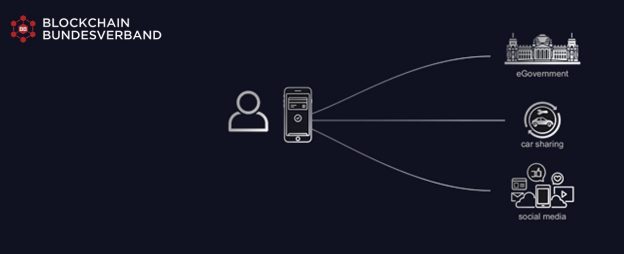
New Position Paper: Self Sovereign Identity defined
9:46 pm in Allgemein by Daniel Heinen
Today, Bundesblock is proud to announce the release of its newly minted #SSIpaper – “Self-Sovereign Digital Identity: A position paper on blockchain enabled identity and the road ahead.” This comprehensive position paper is intended to act as a primary resource for public and private stakeholder audiences to explore how decentralized identity works.
By putting a focus on the concept, the problems that motivate it, its potential use cases and questions evolving around implementation – standards, architecture, security, privacy, and regulation – this paper aims to guide further development and discussion in the field of self-sovereign identity. Ultimately, it is a call to action for individuals, regulators, and business to contribute to a global universal identity framework for all types of entities, built on open and interoperable standards.
A common consensus
The #SSIpaper is the result of a collaboration between many leading organisations and thought leaders active in the decentralized identity space that were brought together by the German Blockchain Association’s (Bundesblock) Identity Working Group. The Identity Working Group is composed of members from German identity companies, and contributors from the rest of Europe and North America who together focus on the practical implementation of decentralized solutions. They build self-sovereign digital identity solutions, conduct research on the legal implications of decentralized technologies, create open source privacy solutions, build decentralized internet infrastructures, and more.
Founded in 2017, members of the Bundesblock believe that blockchain and similar decentralized technologies based on cryptography are fundamental infrastructural innovations and that the potential of blockchain technology can only flourish if citizens as well as private and public institutions network with technology, and if technology itself is recognized by law and society.
A call to action
The #SSIpaper concludes with a vibrant call to action. This will enable you, as one among different audiences, to take concrete next steps that contribute to building a global universal identity layer for all types of entities on open and interoperable standards, and growing the community surrounding it.
More specifically, the call to action invites:
- Individuals to test emerging applications and services as early adopters – you are an integral part in this process to shape the way self-sovereign identity will work, look and feel.
- Regulators to clarify the implementation requirements for GDPR compliance of DIDs, provide guidance on the potential to have eIDAS compliant implementation of self-sovereign identity up to the high level of assurance, and give legal clarification on the horizontal comparability of domain-specific requirements for identity verification.
- Businesses to explore the potential of new decentralized business models and pilot projects that target the specific capacity of self-sovereign identity solutions to be used in an interoperable way across services while remaining independent from identity providers.
- Identity companies to understand the implications of decentralized identifiers and of reusable trust in the form of verifiable credentials and the value-add that decentralized identifiers can bring, and also to adapt their business models and strategies accordingly in order to ensure long term sustainability in the market.
How you can contribute
Lastly, the Bundesblock invites you to let us know what you think using the hashtag #SSIpaper
It is crucial that we continue growing the community, and to include as many different voices and perspectives as possible we invite you to ask us questions or tell us what you think through the social media platform of your choice. Feedback submitted using the hashtag #SSIpaper will be curated and uploaded to a social wall that can be accessed here.



